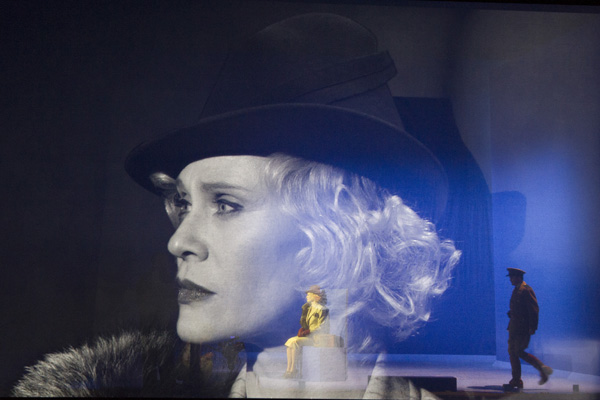Described as ‘a cinematic stage production’, visual artist and filmmaker Stan Douglas and screenwriter/producer Chris Haddock’s creation Helen Lawrence is inspired by postwar film noir. The production, seen as part of the Edinburgh International Festival, weaves together theatre, visual art, live-action filming and computer-generated historical backgrounds.
A huge transparent screen separates the audience from the stage, looming over the scenic blue box where the performers act. There is no other staging, just the screen and a few chairs and boxes. Throughout the show, the actors are filmed and these scenes displayed in live-feed on the big screen that is in front of the stage. This way we can see both the film being displayed and the actors who are playing it, illuminated with a theatrical light. The show is thus an interesting play between live and mediated presence, as our gaze takes in both realities simultaneously. All cameras are operated live by cast: the actors themselves alternate between cameramen and stage performers, making the creation of the film work part of the live performance element.
Adding to these layers is one other: using the chroma-key created with the help of the scenic blue box, the characters in the story are sometimes placed in magnificent scenery, walking in and out of the onscreen action through nonexistent doors.
The show demonstrates an extremely well articulated cinematic technique, combined with perfectly adequate performances, in a plot that explores the stereotypes of gangster movies and film noir. We are drawn into the lives of a group of pimps and owners of illegal settlements in a degraded area of the city of Vancouver in the 1940s, surviving with the connivance of a corrupt police force. There is the husband who never returned from the war; the former soldier who feels at a loss in civilian life; the young lady who is married and seeking an abortion; the young prostitute who falls in love with her client; a lesbian orphan living on favours in a hotel; and of course the femme fatale, the eponymous Helen Lawrence, rich and blonde, who arrives to cause disruption to this world (played beautifully by Lisa Ryder).
The script is unfocused, a web of parallel stories that often don’t get resolved, but in many ways the story is the least important element: this is a show about cinematic technique, and about the relationship (or otherwise) between stage acting and acting to camera. It is grandiose and intellectually stimulating rather than empathetic – we do not really care about these non-existent characters who are mere ghosts of the silver screen. The living experience that theatre creates between performers and audience is lost, no doubt deliberately, as we are constantly drawn to the oversized faces on the giant screen, and left to ponder on the nature and power of cinematic imagery.

